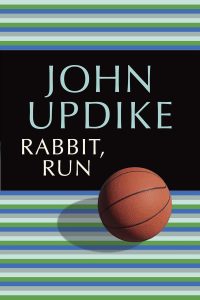Since I am of an age where secrets have long lost their utility, I am only somewhat abashed to admit that until now I’d not read any of John Updike’s “Rabbit” novels. Blame this oversight on, first, the ignorance sired by youthful arrogance and, then later, a senescent narrowing of perspective.

“Rabbit Run,” the first of the quartet, arrived in 1968 to both coy acclaim and snooty dismissal (a “shabby domestic tragedy” croaked the New York Times, despite being “artful and supple”). At the time I was a truculent teenager awhirl in the rejection of everything conventional, so I knew nothing of Updike and could have cared less about the angst of Harry “Rabbit” Angstrom. The second novel, “Rabbit Redux,” came out in 1971, still before maturity bloomed in me. And, by the time “Rabbit is Rich” (1981) and “Rabbit at Rest” (1990) appeared, I’d cast Updike onto the dusty reaches of my father’s bookshelf, like Cheever, Roth, and Bellow.
An advantage of advanced maturity (there are not many) is the ability to do an accounting of the errors of the previous decades and, if lucky, rectify them, which I have done in a small way by reading and being amazed by “Rabbit Run.”
The novel ranks high in many academic curricula and is therefore endlessly analyzed, so I have nothing sagacious to add to what is already written about Updike’s commentary on the constrictions of religion, the expectations of male responsibility (leading to the subsequent belittling of female agency), and the mendacious myth of the post-War American Dream. The non-scholastic word that does come to mind, though is: rubbernecking – because following Harry Angstrom as he careens from one emotionally chaotic soap bubble to the next is like seeing a train wreck in slow motion: both fascinating and horrifying.
Rabbit Angstrom is a detestable protagonist, pathetic, whining, exploitive; thoroughly unlikable. The highlight of his short life was being a high-school basketball star in the working-class suburb of a modest American every-town. At 23, married to a woman he thinks is stupid, the father of one child with another on the way, and employed as the salesman of the MagiPeel kitchen gadget, Rabbit’s disenchantment with every aspect of his life causes him to shed his leash and flee in search of …. well … what? Not being a man of more depth than the agility needed to pivot and launch a jump shot, he has no idea what he wants. As he tells a clergyman who tries to lure him back to the flock:
“If you’re telling me I’m not mature, that’s the one thing I don’t cry over since as far as I can make out it’s the same thing as being dead. … but I tell you, I do feel, I guess, that somewhere beyond all this (he gestures around him) there’s something that wants me to find it.”
Domesticated man searching for meaning in life. Enough to launch a thousand books.
Rabbit’s selfish boorishness is tough to take a times – not again! I gasp – but Updike’s wonderful writing more than offsets the unpleasantness of this man/boy-on-the-run. Updike writes with such precision that his words fit like pieces of a jigsaw puzzle. Unlike so many contemporary novels, which (to me) feel loose and in need of several more drafts, “Rabbit, Run” is tight. No words are out of place, no dialog added for padding. Here is an example:
“His car is waiting for him on Cherry Street in the cool spring noon mysteriously; it is as if a room of a house he owned had been detached and scuttled by this curb and now that the tide of night was out stood up glistening in the sand, slightly tilted but unharmed, ready to sail at the turn of a key.”
Please excuse my longer-than-usual scribbling, but I felt I least owed Updike a few extra words for having ignored him for so long. I am, however, thrilled to discover him. As I soon as I finished “Rabbit, Run,” I ordered the next three.
